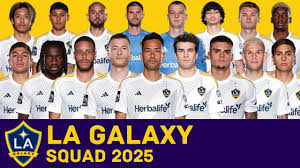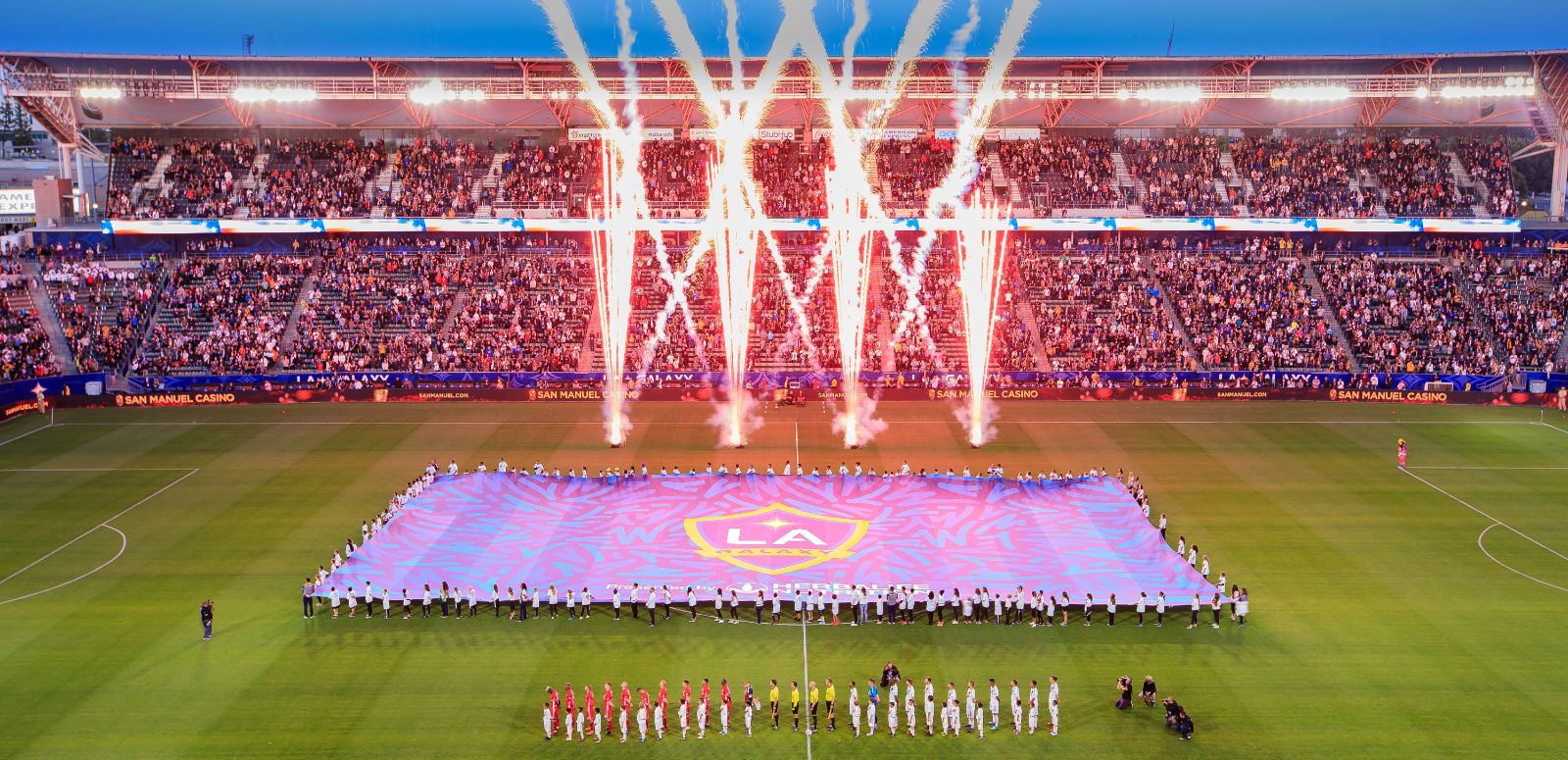MLS
LA Galaxy: Stars of American Soccer

LA Galaxy: Stars of American Soccer
LA Galaxy is one of Major League Soccer’s most iconic and successful franchises, representing Los Angeles, California, and serving as a cornerstone of professional soccer in the United States. Founded in 1994 as one of the ten charter clubs of MLS, the Galaxy began play in 1996, immediately establishing itself as a team with ambitious goals, a global vision, and a commitment to competitive excellence.
The early years of LA Galaxy were marked by a focus on attracting international talent while fostering local development. The franchise quickly became synonymous with success, setting a standard for MLS professionalism and ambition. LA Galaxy has won five MLS Cup titles (2002, 2005, 2011, 2012, 2014), four Supporters’ Shields, and two U.S. Open Cups, making it the most decorated team in MLS history. These accomplishments reflect a combination of strategic leadership, high-profile signings, and sustained commitment to winning at the highest level.
The Galaxy’s brand and identity were enhanced by marquee international stars such as David Beckham, Landon Donovan, Robbie Keane, and Zlatan Ibrahimović. These players not only elevated the team’s on-field performance but also brought global attention to MLS, helping grow soccer culture in the United States. David Beckham’s arrival in 2007, in particular, transformed MLS, establishing LA Galaxy as the league’s global ambassador and contributing to a surge in ticket sales, sponsorship, and media coverage.
LA Galaxy’s team colors—navy blue, gold, and white—reflect both elegance and ambition. The iconic team crest features a star and a dynamic shield, symbolizing the city of Los Angeles and the club’s commitment to excellence. Beyond its trophies, LA Galaxy has cultivated a soccer culture rooted in community engagement, youth development, and fan experience.
The LA Galaxy Academy has been a vital component of the club’s long-term strategy, developing homegrown talent capable of competing domestically and internationally. Notable academy graduates include Efrain Alvarez, Julian Araujo, and Giovanni dos Santos, all of whom have made significant contributions to professional soccer and the U.S. national team. The club’s commitment to youth development ensures a sustainable pipeline of talent and reflects LA Galaxy’s role as a leader in American soccer.
Trivia: Landon Donovan, an LA Galaxy legend, is the all-time leading goal scorer for both the Galaxy and the U.S. Men’s National Team, with 136 international appearances and 57 goals. Donovan’s influence on American soccer is immeasurable, and his tenure at the Galaxy helped solidify the club’s global reputation.
Supporter culture is a defining aspect of LA Galaxy’s identity. Groups such as Angel City Brigade, LA Riot Squad, and Galaxy Outlaws create an electrifying matchday atmosphere, organizing chants, banners, and tifos that inspire players and enhance the stadium experience. This strong supporter base has been instrumental in maintaining LA Galaxy’s identity as a club where culture, passion, and community engagement intersect.
LA Galaxy: Rivalries
Rivalries are central to LA Galaxy’s competitive and cultural identity. The most prominent rivalry is with Los Angeles FC (LAFC), known as El Tráfico, one of the most intense and widely publicized derbies in MLS history. Since LAFC joined the league in 2018, matches between the two clubs have been high-stakes, highly competitive, and widely covered by national and international media. El Tráfico matches combine fan intensity, tactical battles, and star power, often influencing playoff positioning and bragging rights within Los Angeles.
Another historic rivalry is with Chivas USA, which existed until the club folded in 2014. LA Galaxy vs. Chivas USA matches represented the dual soccer culture in Los Angeles, blending Mexican-American fan engagement with professional soccer competition. The dissolution of Chivas USA shifted the focus entirely to LA Galaxy vs. LAFC as the central Los Angeles rivalry.
Beyond local rivalries, LA Galaxy also maintains competitive narratives with other MLS powerhouses such as Seattle Sounders FC, Portland Timbers, New York Red Bulls, and D.C. United, reflecting playoff encounters and high-stakes league matches. These rivalries are often defined by tactical intensity, dramatic goals, and historical significance.
Trivia: The first El Tráfico match in 2018 ended 4-3 in favor of LAFC and immediately set the tone for one of MLS’s most compelling modern rivalries, with memorable goals and passionate fan engagement.
Rivalries for LA Galaxy are about more than points; they reflect regional pride, fan identity, and the historical prestige of competing for the most decorated MLS franchise. Whether in El Tráfico, playoff battles, or historic MLS Cup encounters, LA Galaxy consistently delivers memorable moments.
LA Galaxy: Ownership
LA Galaxy is owned by Philip Anschutz and the Anschutz Entertainment Group (AEG), who have been instrumental in guiding the club since its inception. The ownership group has focused on long-term sustainability, competitive excellence, and global branding. Under AEG’s leadership, LA Galaxy has attracted international stars, invested in facilities, and developed a strong fan culture.
The ownership model emphasizes strategic growth, including stadium development, academy investment, and global outreach. AEG’s vision has helped LA Galaxy become not just an MLS club, but a global brand associated with elite soccer, professional management, and long-term competitive ambition.
Trivia: AEG also owns venues such as Staples Center and other major entertainment assets, demonstrating the organization’s ability to integrate sports, entertainment, and business operations to elevate the profile of LA Galaxy.
The club’s ownership has consistently prioritized combining international talent with homegrown development, ensuring that LA Galaxy remains competitive while contributing to the broader growth of American soccer.

Watch LA Galaxy
LA Galaxy plays at Dignity Health Sports Park (formerly StubHub Center), located in Carson, California, approximately 14 miles south of downtown Los Angeles. Opened in 2003, the stadium is a soccer-specific venue with a seating capacity of approximately 27,000 for MLS matches. It offers world-class amenities, premium seating, and an environment designed to maximize fan engagement and matchday experience.
The stadium is known for its dedicated supporter sections, including the Angel City Brigade and LA Riot Squad, whose coordinated chants, banners, and tifos have become central to the Galaxy’s home-field advantage. Matches at Dignity Health Sports Park are known for high energy, fan participation, and creating an environment that inspires players.
The facility also integrates training facilities, administrative offices, and youth academy complexes, providing a unified environment for professional and developmental operations. Beyond MLS matches, the stadium hosts concerts, international friendlies, and community events, cementing its role as a hub for soccer and entertainment in Southern California.
Trivia: Dignity Health Sports Park hosted the 2003 and 2016 MLS Cup finals and was a venue for the 1994 FIFA World Cup training camps, reflecting its importance in U.S. soccer history.
LA Galaxy: This Season
The 2025 MLS season sees LA Galaxy blending experience with youth, maintaining competitiveness in the Western Conference. Key players include Jonathan dos Santos, Dejan Joveljic, Robbie Robinson, and goalkeeper Jonathan Bond, all of whom contribute skill, leadership, and tactical adaptability. Academy graduates, such as Efrain Alvarez, continue to make significant contributions, underscoring the importance of homegrown talent.
Head coach Greg Vanney emphasizes possession-based play, creative attacking patterns, and tactical flexibility. The team prioritizes controlling the tempo, exploiting wide spaces, and maintaining defensive organization, aiming to dominate matches through strategic movement and efficient transitions.
Rivalry matches, particularly El Tráfico vs. LAFC, are focal points of the season. Western Conference fixtures against Seattle Sounders, Portland Timbers, and Real Salt Lake also hold playoff implications, highlighting the importance of consistency and squad depth. Fans remain deeply engaged, supporting both the style of play and the pursuit of trophies.
Trivia: Jonathan dos Santos, a long-serving midfielder, has been a club captain and pivotal figure in the locker room, embodying the leadership culture instilled by LA Galaxy over decades.
LA Galaxy aims to continue building on its legacy, combining experienced MLS players, international signings, and academy graduates to challenge for both the MLS Cup and Supporters’ Shield. Success in the 2025 season is seen not only as a measure of results but as a continuation of the club’s historic role in American soccer.
LA Galaxy: What to Follow
Several storylines define LA Galaxy’s trajectory in 2025 and beyond. First, youth development remains central. The Galaxy Academy continues to produce players capable of impacting the first team and advancing to professional leagues internationally, ensuring a sustainable talent pipeline.
Second, supporter culture is a defining feature. The Angel City Brigade, LA Riot Squad, and Galaxy Outlaws maintain high-energy matchday experiences that inspire players and engage the broader community. Coordinated chants, banners, and tifos reinforce the club’s cultural identity and connect fans to the team’s historic success.
Third, competitive performance continues to be a priority. LA Galaxy seeks consistent playoff qualification, U.S. Open Cup success, and MLS Cup contention. Tactical evolution, squad cohesion, and strategic acquisitions will determine the team’s ability to maintain its status as MLS’s most decorated club.
Finally, community and global engagement are essential. LA Galaxy participates in charitable initiatives, youth clinics, and civic partnerships, embedding the club within the social and cultural fabric of Los Angeles. Its global recognition, amplified by historic signings like David Beckham and Zlatan Ibrahimović, continues to elevate the profile of MLS and American soccer.
Trivia: LA Galaxy holds the record for the most MLS Cup victories, and its combination of international stars and homegrown talent has made it one of the most influential clubs in North American soccer history.
LA Galaxy represents the intersection of sport, culture, and community in Southern California. From the chants of passionate supporters to the high-profile international signings, the club has established itself as a symbol of excellence and ambition in MLS. With strategic leadership, a world-class academy, and a deep connection to its fanbase, LA Galaxy is poised to maintain its dominance and continue shaping the future of American soccer.
